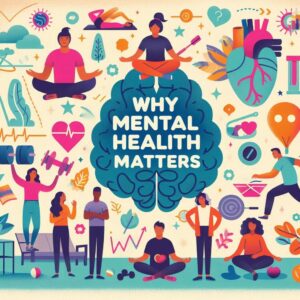Understanding Mental Health: Challenges and Solutions
Mental health affects every aspect of our lives, from our emotions and relationships to our ability to handle stress and challenges. Yet, many people struggle to access the care they need due to stigma, financial barriers, and other obstacles. Understanding these challenges and learning how to navigate them can make a difference in improving mental well-being for ourselves and those around us.
Why Mental Health Matters

Mental health affects how we think, feel, and handle life’s challenges. It influences relationships, job performance, and overall well-being. However, many people face barriers to accessing the help they need. Understanding these obstacles—and how to overcome them—is the first step toward better mental health.
Seeking professional help is not a sign of weakness. Mental health issues can affect anyone, regardless of age, gender, or background. Getting support is a courageous and empowering decision that can lead to a happier and healthier life.
Factors That Influence Mental Health

Several biological and environmental factors shape mental well-being. Recognizing these influences can help individuals take proactive steps toward better mental health.
Biological Influences
Research from the National Institute of Mental Health (NIMH) shows that genetics play a role in conditions like depression, bipolar disorder, and schizophrenia. While genes don’t guarantee someone will develop a mental illness, they can increase the likelihood.
Childhood Trauma and Adverse Experiences
The Centers for Disease Control and Prevention (CDC) emphasize that childhood trauma—such as abuse, neglect, or family instability—can affect mental health long-term. These experiences may lead to anxiety, depression, post-traumatic stress disorder (PTSD), or substance use disorders.
Chronic Stress and Life Challenges
Stress is a normal part of life, but long-term stress can harm mental health. The American Psychological Association (APA) warns that financial problems, work stress, and strained relationships can lead to anxiety, burnout, or depression. Finding ways to manage stress early can prevent serious mental health struggles.
Grief and Loss
Grieving the loss of a loved one can take an emotional toll. According to the National Center for Biotechnology Information (NCBI), grief is a natural response but can become overwhelming. Professional support, friends, and healthy coping strategies can help individuals process loss effectively.
External Barriers to Mental Health Care

Even when people recognize their need for help, they often face barriers that prevent them from accessing care.
Stigma Surrounding Mental Health
Many people hesitate to seek help due to negative societal attitudes. Stigma can cause shame, leading individuals to hide their struggles instead of addressing them.
Ways to Reduce Stigma
- Education – Raising awareness about mental health conditions.
- Encouraging Open Conversations – Normalizing discussions about mental health.
- Responsible Media Representation – Ensuring accurate portrayals of mental health issues.
- Policy Advocacy – Supporting laws that improve mental health access.
- Community Support – Creating safe spaces for people to seek help.
Financial and Insurance Challenges
Mental health care can be expensive, and many individuals struggle with financial barriers.
Common Financial Barriers
- Insurance Restrictions – High deductibles, limited provider networks, and inadequate mental health coverage.
- High Treatment Costs – Therapy sessions, medications, and time off work can create financial strain.
- Limited Resources – A shortage of mental health professionals and underfunded facilities make care harder to find.
Cultural and Language Barriers
People from diverse backgrounds may experience additional challenges in seeking mental health care.
Barriers Affecting Access
- Language Barriers – Miscommunication between patients and providers.
- Cultural Differences – Some communities may have different views on mental health and treatment options.
- Fear of Discrimination – Concerns about biased care may discourage individuals from seeking help.
Providing culturally sensitive care and multilingual services can improve accessibility.
Mistrust of Providers and Medication
Some individuals hesitate to seek mental health support due to concerns about treatment effectiveness or medication side effects.
Ways to Build Trust
- Education – Providing clear, reliable information about mental health treatment.
- Patient-Centered Care – Tailoring treatment to individual preferences.
- Alternative Approaches – Exploring therapy, lifestyle changes, and non-medication treatments.
The Importance of Professional Mental Health Support

Mental health professionals offer critical guidance and tools to help individuals navigate challenges. Seeking support—even temporarily—can transform lives.
Benefits of Therapy and Counseling
Expert Guidance
Mental health professionals have specialized training in understanding human emotions, behaviors, and thought patterns. They can diagnose conditions like anxiety, depression, PTSD, and more, offering treatments backed by scientific research. Therapy is not just for severe mental health conditions—it’s also helpful for everyday stress management, improving relationships, and personal growth.
Early Intervention
Many mental health challenges start small and gradually become more difficult to manage. Seeking help early allows individuals to address their concerns before they escalate. Early intervention can prevent a condition from worsening and improve recovery outcomes, making it easier to regain emotional balance.
Validation and Emotional Support
Talking to a therapist can be a deeply validating experience. It provides a safe and confidential space to express thoughts and emotions without fear of judgment. Feeling heard and understood can be incredibly healing, especially for those who struggle with isolation or emotional distress.
Coping Strategies for Everyday Life
Mental health professionals teach practical coping strategies that help people handle stress, anxiety, and emotional hardships more effectively. These may include:
-
Relaxation techniques – Breathing exercises, meditation, and mindfulness help reduce stress.
-
Cognitive tools – Techniques such as reframing negative thoughts can promote healthier thinking patterns.
-
Communication skills – Learning how to express emotions in a healthy way can strengthen relationships.
-
Problem-solving approaches – Developing strategies to manage conflicts and difficult situations.
How to Improve Access to Mental Health Care

Creating a supportive environment for mental health requires action on multiple levels.
1. Talk About Mental Health Openly
One of the easiest ways to help is to normalize conversations about mental health. Talking about stress, anxiety, or therapy in everyday discussions can make it feel less intimidating. If a friend or family member is struggling, encourage open conversations and listen without judgment.
2. Educate Yourself and Others
Learn about mental health challenges and share helpful information with others. You don’t have to be an expert—just understanding the basics can help reduce misconceptions. Reading reliable sources, following advocacy groups, and staying informed can make it easier to support those around you.
3. Support Affordable Care Initiatives
Many people struggle to afford mental health services. You can help by supporting organizations that offer free or low-cost mental health care, donating to mental health charities, or advocating for policies that improve insurance coverage for therapy and medication.
4. Be Inclusive and Aware of Cultural Differences
Some people face extra challenges in getting mental health care due to language or cultural barriers. If you know someone who struggles with accessing services because of these issues, help them find providers who offer multilingual support or culturally sensitive care.
5. Challenge Stigma When You See It
If you hear someone making negative comments about mental health, speak up. Correcting misconceptions—such as the idea that therapy is only for people with “serious problems”—helps make mental health care more accessible to everyone.
6. Encourage Seeking Help Without Pressure
If someone close to you is struggling, gently encourage them to consider professional support, but don’t push them if they’re hesitant. Sometimes, people need time to process their feelings before they feel ready to take that step. Let them know help is available and they’re not alone.
7. Share Mental Health Resources
If you come across helpful mental health resources—like crisis hotlines, local support groups, or online therapy options—share them with friends, family, or on social media. You never know who might need them.
Moving Forward

Mental health is a lifelong journey, influenced by both internal and external factors. Challenges are common, but help is available. By recognizing barriers, improving access, and fostering understanding, individuals and communities can create a more inclusive and compassionate world.
Seeking professional mental health support is a powerful step toward healing and self-improvement. Breaking down stigma, financial barriers, and cultural challenges will help ensure that everyone has access to the care they deserve.










